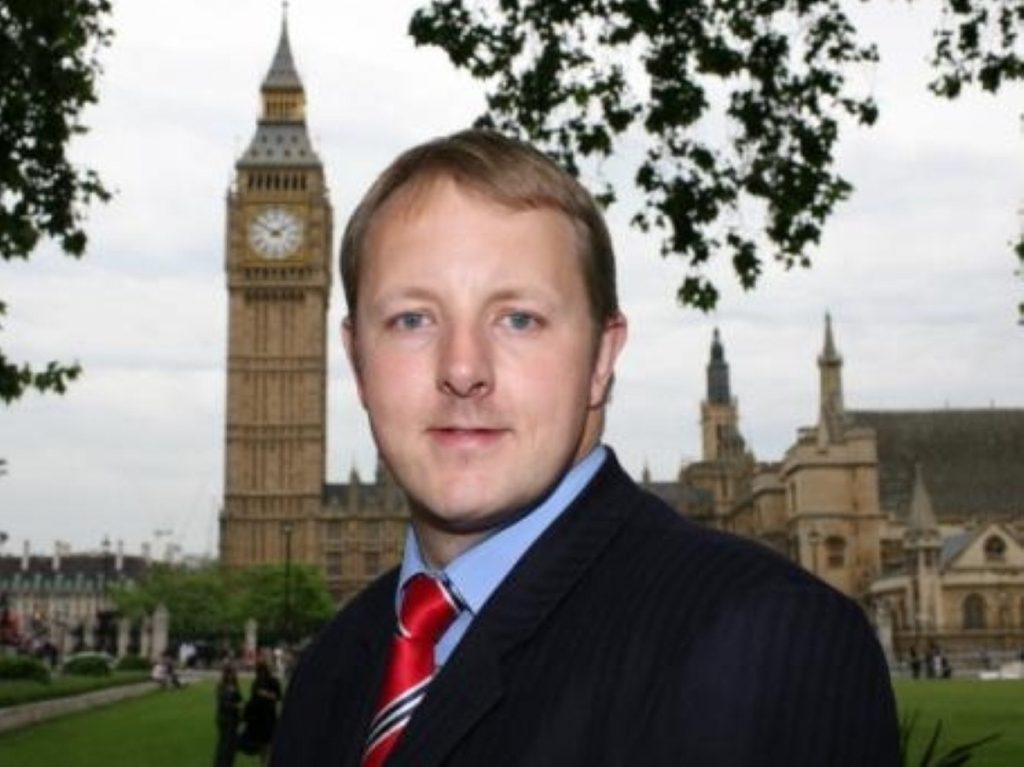Interview: Toby Perkins
By Rebecca Burns
Toby Perkins, the Labour MP for Chesterfield, is a gentle giant of a man. The broad-built blonde must be one of the tallest figures in parliament. But Chesterfield’s new, softly-spoken representative has a hard fight ahead.
“My nose survived and my ears just about” he points out proudly from his time as second row. But Perkins doesn’t tend to indulge in macho tales of rugby bravado. In fact, when I first meet him I interrupt a discussion about how a Dylan Thomas film inspired a few lines of his own poetry (sadly he didn’t put pen to paper).
Perkins is great grandson of the playwright A P Herbert and son of film critic Victor Perkins, but is quick to distance himself from any inherited literary talent. “If there’s one thing worse than a world without poetry it’s a world with bad poetry” he informs me when I push for a few lines of his own work. He admires US President Obama, for “moving you to action with the strength of rhetoric” but assures me I’m better off without his own contribution.


Whether or not Perkins counts poetry as a personal forte, the MP has come a long way since leaving school without A Levels to work as a sales representative. Life before parliament involved running a sports equipment website, Club Rugby, and travelling the country as regional manager in a recruitment firm. The transition to parliament has so far been “really exciting” says Perkins. “I’m trying to make sure I make a lot of contributions, listen to the debates and learn the issues and develop ideas about the kind of issues and what kind of MP I’m going to be.
“It’s still strange to think that this is actually my job and I get paid for it” he says, looking bemused as he drinks coffee in the grandeur of parliament. Perkins is one of the class of 2010 who has not had daily dealings with parliament as a political advisor or lobbyist, so he’s more wide-eyed than most. “I’ve been local councillor and it’s a bit strange to think this isn’t something I’m trying to fit around the rest of my life, but is something that actually is the whole of it.”
Perkins has a fresh-faced excitement that is far more common now that much of the old school has been swept away. I’m apprehensive that this may not last long, particularly considering the forthcoming cuts and Chesterfield’s industrial character. What does he want for Chesterfield, I ask?
“Jobs,” he says. “The biggest focus of my campaign was around jobs. People in Chesterfield have a real work ethic and a desire to work in a skilled environment. There’s a strong feeling they want to get back to a more industrial, hands on type of work in future.”
The Chesterfield MP does not appear impressed by the coalition’s efforts so far. He thinks the government has no idea where it’s going with the effect of cuts on public services, but toys with the argument that we are experiencing a return to Thatcherism. “I just don’t think people will tolerate that, public services going back to that sort of state of decay,” he says. The decision to make cuts immediately and deeply is, he suggests, a “purely political decision” so that the blame can be deposited at the door of the Labour party. “If they make them in two years time they’re going to have to take more responsibility for them”.
He says the cuts are “really retrograde stuff”, referring in particular to the removal of an £80million loan to Sheffield Forgemasters that may well affect his constituency. “People are really angry about it,” he tells me. “If you go into a public sector organisation and tell them what they have had have been times of riotous abandon and plenty, they wouldn’t really recognise that description.”
Alongside public reaction to the effects of cuts, Perkins thinks the real sticking test for the coalition will be whether it can survive the referendum on the Alternative Vote. If the Liberal Democrats don’t manage to alter the voting system it may “reduce the Liberal Democrat commitment to the coalition” into which they were “shoehorned”.
Either way, Perkins is not happy to be playing out his first premiership in opposition. He remains committed to his socialist Labour roots despite the new political consensus for cutting spending. Having said that, Nelson Mandela is Perkins’ political hero specifically because “he demonstrated that one great person with a great cause can overcome and can change the whole course of history”. Eternally optimistic, the gentle giant may win this fight eventually.












